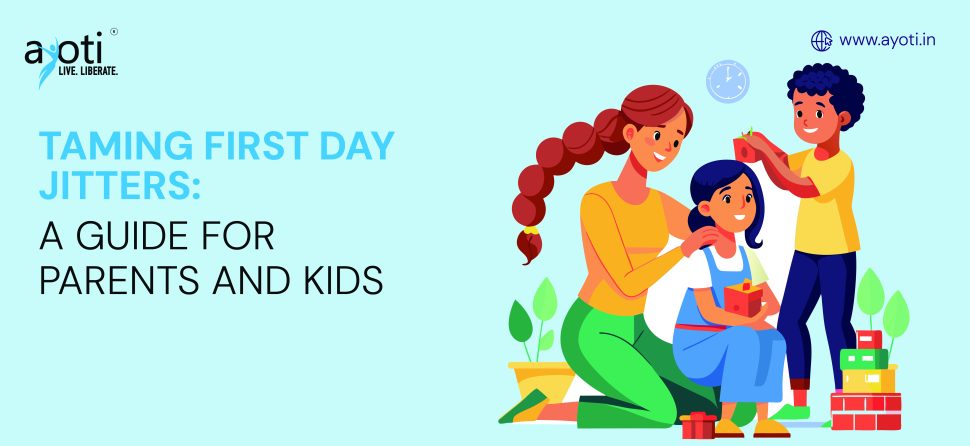By ayoti
Taming First Day Jitters: A Guide for Parents and Kids
That first day of school is significant for parents and their kids. For kids, there is a sense of excitement mixed with anxiousness, curiosity, and some questions. It’s often both joyful and worrisome for parents as they watch their children from when they were small to growing up.
If you are feeling many different emotions right now, it’s normal. It’s quite normal for your first day to feel a bit nervous. Thankfully, a bit of planning and learning together can ease this process and make it enjoyable for both of you. We’ll look at how you can help your child (and yourself) handle the first-day jitters, making them feel assured of themselves.
Why Do Many Feel Nervous on Their First Day of Work?
Kids tend to do better when they have regular patterns, feel recognized, and trust their environment. When school begins, the usual routine is ruined by introducing fresh students, new places, and demands. Little ones may find such a change to be very overpowering.
After all, school is more than a building; it’s about the atmosphere around it:
- Will I make friends?
- What if the teacher is strict?
- What if I get lost or can’t find my classroom?
- What if I miss my parents?
Even teens may feel the stress of fitting in, especially when they’re starting a new grade or facing a return to in-person learning from online learning.
And parents? Watching your child start their grown-up life isn’t easy. Their instinct is to protect, but also the reality that kids must manage things alone. This tension fuels the first-day jitters for grown-ups, too.
Ways to Help Your Child Get Ready Emotionally
- Feel Free to Discuss How You Feel
Talk to your children from the start. Find out how your child feels about beginning their studies. Be open to all children’s feelings, especially excitement, fear, curiosity or confusion.
Try phrases like:
- “It’s normal to feel a little scared about new things.”
- “I felt nervous on my first day, too.”
- “What are you looking forward to the most?”
Open dialogue builds trust and shows that their feelings matter.
- Visit the School together.
Whenever possible, arrange a visit before the first day. Walk through the hallways, visit the playground, and check out the playground. Familiarity reduces the fear of the unknown.
Some educational institutions arrange a meeting between you and your teachers before classes start. Make sure your child takes advantage of these and asks questions.
- Role-Play Scenarios
Exercise should be seen as a chance to boost your spirits. Pretend to be the teacher or a classmate and practice introductions or asking for help. Pretending to be someone else in a role-play can reduce social anxiety and prepare children for real social situations.
Make a drop-off routine part of your practice so you don’t experience anxiety in the morning.
- Set up a Fixed Routine
Keeping your routine in sleep, meals and morning rituals is very important. A routine day gives kids a feeling of safety. Adjust sleeping schedules about a week before school starts to be sure your children are not tired.
The night before, take care of your child’s uniform, backpack, and lunchbox. When you manage the morning easily, your worries will have little space to grow.
How to Support Yourself as a Parent
On your first day, you’re facing new emotions. You should stay strong and calm to support your child.
- Don’t fight Your Feelings.
It’s normal to experience anxiety, sadness or a sense of relief. Don’t hold everything inside. If you have a partner or friend or you know another parent, try to open up to them. Telling someone how you feel helps you feel less stressed.
- Be keen on being realistic about what you hope to achieve.
Don’t be surprised if the first day doesn’t go as planned. It’s normal for your child to react by crying, being shy or experimenting — that’s all a part of settling in. Do you remember it takes time and happens over time, not just on one day?
Be happy about little successes such as arriving in class calmly and interacting with people you don’t know.
- Plan a post-school celebration.
Whether you enjoy treats, favourite books or simple talks, create a happy activity for after the school day. It helps your family take some time out and forget about your worries.
- Keep communication open.
Check in regularly, but don’t ask many unnecessary questions like an interrogation. Try asking your child relaxed questions such as “Did you have a good day?” or “Did any surprises happen today?” This helps you show you care yet keeps everything relaxed.
Tips for the Big Morning
The first morning is the ultimate test — here’s how to make it easier.
- If you rise early, mornings will be stress-free for everyone.
- Start your day with something healthy and nutritious. Low blood sugar can make someone’s nerves even weaker.
- Don’t be in a hurry when you leave the house. Allow yourself a bit of extra time for surprises.
- Maintain a good mood, as it helps you set the tone and keeps you calm. Showing calmness and confidence will help them learn the same thing.
- Saying Farewell in Confidence: Keep your goodbye short but with grace. Saying goodbye for a long time can make both people more worried. Tell your child you’ll be returning, and they’ll have a good day while you are away.
How to Know When Extra Support Is Needed
The nervousness most children experience on their first day tends to go away fast. When anxiety keeps disrupting your sleep, hunger or your regular day, getting help from a professional could be advisable.
Some signs to keep in mind, for example:
- Refusing to let children go to school or having them always want to stay near you
- Regular episodes of stomach or headaches that aren’t caused by an illness
- Spirits can change rapidly between anger and depression
- Issues sleeping for a week or longer
Your child’s needs can be met with strategies developed by a counsellor, paediatrician or school psychologist.
The Silver Lining
Those first-day jitters tell you that both your child and you care very much — about school and each other. It’s a big change, but it is also the beginning of new friendships, handling new challenges, and expanding your knowledge.
Final Thought
Back-to-school season is a rollercoaster for families. Embrace the jitters as part of the ride, lean into preparation and open conversation, and know that with patience and love, you and your child will both find your footing.
Here’s to confident first steps and a school year full of possibilities!





